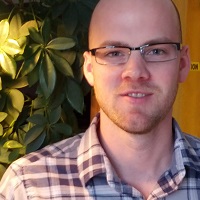 |
Kelli KoltynThe head of the lab. Learn more on her faculty profile page. |
 |
Kevin CrombieI grew up in nearby Columbus, Wisconsin. Prior to beginning my graduate career at UW–Madison, I earned a BS in psychology from Purdue University-Fort Wayne, and completed a Master’s degree in movement science at Barry University, focusing on psychological responses to physical activity interventions in clinical populations. Since arriving at UW–Madison, my research has focused on understanding the psychobiological responses to exercise in clinical and non-clinical populations. Specifically, my dissertation research is focused on delineating the role of exercise as a non-pharmacological treatment for individuals with posttraumatic stress disorder, possibly due to exercise-induced activation of the endocannabinoid system. |
 |
Brianna LeitzelarI am from “up north,” Sturgeon Bay, Wisconsin. I received my bachelor’s degree in exercise science at St. Olaf College in Minnesota. After taking a year off, I went to Ball State University in Indiana and completed a dual-degree program in sort and exercise psychology and mental health counseling. During my master’s program, I participated in applied sport psychology work, counseling, and completed a thesis examining how regulatory fit impacts anxiety, arousal, and performance. Here at UW–Madison, I plan to focus my research on the mental health benefits of exercise for cancer survivors, particularly in alleviating neuropathic pain, and examining the endocannabinoid system as a potential mechanism for these effects. |
Brellenthin AG, Crombie KM, Hillard CJ, Koltyn KF. Endocannabinoid and mood responses to exercise in adults with varying activity levels. Medicine and Science in Sports & Exercise. 2017;49(8):1688-1696. doi: 0.1249/MSS.0000000000001276.
Crombie KM, Brellenthin AG, Hillard CJ, Koltyn KF. Endogenous cannabinoid and opioid system interactions in exercise-induced hypoalgesia. Pain Medicine. 2017 (epub ahead of print). doi: 10.1093/pm/pnx058.
Brellenthin AG, Crombie KM, Cook DB, Sehgal N, Koltyn KF. Psychosocial influences on exercise-induced hypoalgesia. Pain Medicine. 2017;18(3):538-550. doi:10.1093/pm/pnw275.
Brellenthin AG, Koltyn KF. Exercise as an adjunctive treatment for cannabis use disorder. The American Journal of Drug and Alcohol Abuse. 2016;42(5):481-489. doi: 10.1080/00952990.2016.1185434
Koltyn KF, Brellenthin AG, Cook DB, Sehgal N, Hillard CJ. Mechanisms of exercise-induced hypoalgesia. The Journal of Pain. 2014;15(12):1294-1304.
Koltyn Receives National Institutes of Health (NIH) Support for Study Examining “Stand Up and Move More” Sedentary Behavior Intervention – https://kinesiology.qa.admin.education.wisc.edu/uws-koltyn-receives-nih-support-study-examining-stand-move/
Crombie Receives American College of Sports Medicine Dr. Raymond A. Weiss Research Endowment Grant – http://www.acsm.org/about-acsm/who-we-are/history/past-foundation-research-award-grant-winners
We are currently recruiting men and women with a current diagnosis of PTSD for a research Study!
Men and women between the ages of 18 – 45 years who have a current diagnosis of Posttraumatic Stress Disorder (PTSD) are needed for a research study aimed at investigating changes in mood and biomarkers in the blood following a 30-minute bout of exercise and a standard and widely used psychosocial stress task. Your participation in this study would involve two lab visits. You will be monetarily compensated ($70.00) for your participation in this study. Men and women who are interested in taking part in this study or would like additional information should email Kevin Crombie at kmcrombie@wisc.edu or call the Exercise Psychology Laboratory at (608) 262 – 2457 and leave a message saying you are interested in the “Exercise and Stress” study, along with your name, phone number, and the best times to call.